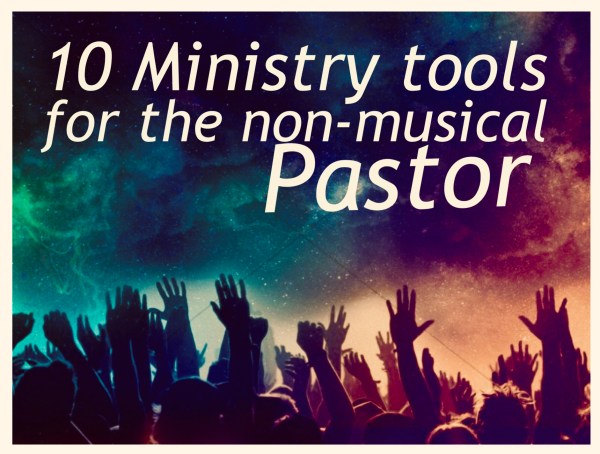YouNot all of us pastors have the luxury of having a full worship band, pianist and an ear for music. Let’s face it, some of us reading this article right now can’t carry a tune in a bucket…and that’s okay. We don’t all have to have the gift of music. Scripture even points out the various gifts that we are all given and appointed with (Eph 4:11, 1 Peter 4:10-11), and just as the focus on speaking in tongues can become an issue, so too then use of music. Don’t get me wrong, music in worship can be most beneficial to the body of Christ, but it should be viewed as a conduit to deeper worship, not the desired end result.
Today, let us focus on this element of worship with the non-musical pastors in mind. If you fit this mold, then take note. My wife is very, very talented in other areas of ministry, but she will openly admit that music is not one of those talents.
There are many, many pastors in small churches or corps that do not have a musical bone in their bodies, and that’s okay. I want to help you find some tools to use within worship that will assist you and your congregation within and even around the conduit of music on Sunday.
1) YouTube Videos/YouTube Video Downloaders.

If you are not musical at all, you might utilize a plethora of Christian worship music on YouTube. There are even Youtube downloaders that you can use to have the videos accessible in places of worship where WiFi and the internet are sketchy or nonexistent. Using a video on YouTube could include modern top 40 Christian songs, a movie clip, or numerous other topics other than just music.
Don’t neglect the power of videos and or worship songs in your Sunday services. Feel free to be creative and intentional in the planning of your service theme too. Caution: This will take time, so don’t just throw everything together on Saturday night and expect amazing results…intentional planning takes time and hours. We are all busy people, but not taking the time to find the appropriate videos and/or music, is noticeable in our services (I’ve been guilty of this too).
2) iSing Worship (app)
 This is a great app that does cost a little bit, but is a tremendous tool if you have a portable device like an iPad or iPhone. The app is free, but the songs will you about $3 a piece, which is only a dollar more than what you would pay for songs you currently buy on Google Music store or the apple iTunes Store. When you buy these songs, you then have the ability to include all of the elements of the song (i.e lead vocals, guitar, drums etc.). So, for instance, if you wanted to lead the song you could turn the vocals down and sing with the music like it was Christian Karaoke hour. Or iSing worship could become your worship band in a box by simply hitting play. Be sure, however that you plan the songs you are going to sing ahead of time and have the words either printed or displayed on the screen for the congregation to sing along.
This is a great app that does cost a little bit, but is a tremendous tool if you have a portable device like an iPad or iPhone. The app is free, but the songs will you about $3 a piece, which is only a dollar more than what you would pay for songs you currently buy on Google Music store or the apple iTunes Store. When you buy these songs, you then have the ability to include all of the elements of the song (i.e lead vocals, guitar, drums etc.). So, for instance, if you wanted to lead the song you could turn the vocals down and sing with the music like it was Christian Karaoke hour. Or iSing worship could become your worship band in a box by simply hitting play. Be sure, however that you plan the songs you are going to sing ahead of time and have the words either printed or displayed on the screen for the congregation to sing along.

One of the challenges for many pastors, regardless if they are musically inclined or not is the use of other people in worship services. Do not be afraid to ask other people to help out, or lead elements of the service. In fact, a shared worship experience with other people leads to a better all around worship service. If you’re at all like me, perhaps you are a control freak and you want to ensure everything goes according to plan, perhaps we have to come to the conclusion that we must trust the Holy Spirit as well as other people.

The apostle Paul told Timothy not to allow others to look down on him because he was young (1 Timothy 4:12)…the same can be said about young people in our churches and in the worship setting. Use your young people, don’t discount their willingness and abilities to lead. Teach them, disciple them as the future leaders by investing in them now within your worship services. Have them help by reading a prayer, or scripture verse, a skit, or even by leading a song. Some of your young people might be more musically gifted than you are – so cultivate that gift and use it in your worship service!Also, don’t let older people in your congregation overly criticize your young people. We do not want to discourage their growth as future leaders, we want to encourage them. Unfortunately most churches have the old grouches who grumble at anything new – even young people. Don’t tolerate that behavior from any member of your congregation. We need to disciple our youth, and this is a great way to begin to do that!5) Set the Stage (don’t neglect this!)
Regardless if you are musically inclined or not, we can become more creative in our church decor. Don’t neglect the aesthetics of your worship space! Take into account the seasons, the topics you are preaching on and use your worship space to reach all of the senses of the worshipper. Use smells (plug ins, or spices, candles – but don’t let it become over-powering. Use sites – place artwork up, or banners, build sets out of styrofoam and paint it…there are many links of Pinterest and other websites to explore and tap into our creative sides.

Use worship songs at the beginning of the service through cd/mp3/computer…set the stage with song (even if you aren’t musical).
When we actually plan the scenes of worship within our worship spaces we introduce our congregations to a living and moving God. The stages and worship places are concerts or performances, but there is something to be said about being intentional with the sights and sounds (and smells) or our spaces for the purpose of ushering our congregants into the very throne room of God.6) Worship Band in Hand (app)

This app also costs some money in terms of purchasing the songs that you want yo use, but it comes with a lot of features and abilities. You get one free song included upon installation of the app, it gives you the opportunity to try in it out and see if you like it.7) Auto Pad(app)

This app will cost you $2.99, but there are many features that this ambient sound pad contains that could set your worship onto a new plain. Perhaps you use this during your sermon and the use of tone and ambient sounds can deepen the worship experience. Using such a tool might require you to include/recruit others to help you operate the app while you preach or read scripture. Give this app a try and experiment with its use in your worship service!8) Lead a Messy Church instead!

Do you want to break up the monitany of the worship experience? Do something different. Some have begun to do dinner church, while others have started to incorporate Messy church into the worship experience. Messy church can be a great way to reduce your music phobia by utilizing stations through this very practical, teachable methods.here is a link to a few that we have done over the years – https://pastorsponderings.org/category/messy-church/9) Conduct A Quaker Service

A Quaker service generally is not focused on music, but instead the recitation of poetry, prayers, and the element of silence. This type of service might be a stretch to many of your congregants, even more so than Messy Church because of the use of silence. Despite the drawbacks, using this type of worship setting, but be just the thing your church or corps needs in order to have everyone dig a little more deeply into their hearts and minds.
Here is a link for more information on the Quaker service
10) Prayer Stations/Artistic Approach
 Conduct a prayer service with stations.
Conduct a prayer service with stations.
If you want to get creative, you can go onto Pinterest and explore the many ideas expressed there when it comes to Prayer Stations. This approach takes the focus off of the use of music and onto a hands-on prayer service. You could quietly play worship music in the background through your sound system and encourage everyone to spend the next 45 minutes at the many prayer stations that you have intentionally set up in your sanctuary. Here are some links to help guide you in this:
Prayer Loom
Thy Kingdom Come
Scrabble Pieces
More Pinterest Ideas
These are just 10 suggestions to help the non-musical and musical pastor a like, for the purpose of creating a deeper, more meaningful worship service. These are not exclusively ‘it’ for worship ideas, but just a primer for more exploration and worship developement in your corps & churches.
Please tell us what you use in your churches that help to make your worship experiences more meaningful and helpful to you and your congregation? Post your commends below, we want to hear from you.
Something more for all of us to Ponder today.
To God be the glory!






 In a
In a 
 Coupled with spotting fakes, Millennials are repulsed by hypocrites who preach one thing but live another way. The “do as I say, not as I do” motto needs to die not only in the Church but in our Army as well. If it exists, stamp it out, address it, don’t let it fester and lead to the spiritual death of your corps body. I have heard of corps (years ago) who had bandsmen who would dress up in their uniforms just to perform in the band and as soon as their part in the service was complete they would rush out the back door and leave – what kind of witness is that to our young people? Millennials have also seen moral failures in society, and perhaps even in the Salvation Army. Divorce rates have been on the rise and half of millennials will be coming from either one parent households or having split their time in two homes. Some have witnessed the effects of moral failure first hand in family members and most deeply desire to change that narrative in their own lives.
Coupled with spotting fakes, Millennials are repulsed by hypocrites who preach one thing but live another way. The “do as I say, not as I do” motto needs to die not only in the Church but in our Army as well. If it exists, stamp it out, address it, don’t let it fester and lead to the spiritual death of your corps body. I have heard of corps (years ago) who had bandsmen who would dress up in their uniforms just to perform in the band and as soon as their part in the service was complete they would rush out the back door and leave – what kind of witness is that to our young people? Millennials have also seen moral failures in society, and perhaps even in the Salvation Army. Divorce rates have been on the rise and half of millennials will be coming from either one parent households or having split their time in two homes. Some have witnessed the effects of moral failure first hand in family members and most deeply desire to change that narrative in their own lives.



 1. Have an Identity apart from the Army
1. Have an Identity apart from the Army





 Are we alert to the ever present need to adapt to our changing communities?
Are we alert to the ever present need to adapt to our changing communities?
 A new passion for souls must be prayed for, not just in our hearts but in every soldier’s heart. This isn’t just an army that preserves a heritage of the yesteryear, this is an army that carves out its destiny in the present and future through faithfulness and reliance on the Holy Spirit! We must recognize this need! We must reorganize, realign, re-imagine and act upon this mission of ours! We are not an army to sit on our backsides and do nothing! No! We MUST be a forward moving army, who has accepted and adapted to this modern spiritual war we are in. We cannot capitulate, grow soft and comfortable – to do so will bring about our fall, and someone else will take our place! I say we still have a war to wage! I say we support our Officers not just in prayer but action. I say we support our Soldiers not just in flowery words on Sunday mornings behind the pulpit but with deep compassion, love, truth and by God’s authority. When we are united as one Army, we are so much more effective than just solitary entities running around in the streets trying to do good.
A new passion for souls must be prayed for, not just in our hearts but in every soldier’s heart. This isn’t just an army that preserves a heritage of the yesteryear, this is an army that carves out its destiny in the present and future through faithfulness and reliance on the Holy Spirit! We must recognize this need! We must reorganize, realign, re-imagine and act upon this mission of ours! We are not an army to sit on our backsides and do nothing! No! We MUST be a forward moving army, who has accepted and adapted to this modern spiritual war we are in. We cannot capitulate, grow soft and comfortable – to do so will bring about our fall, and someone else will take our place! I say we still have a war to wage! I say we support our Officers not just in prayer but action. I say we support our Soldiers not just in flowery words on Sunday mornings behind the pulpit but with deep compassion, love, truth and by God’s authority. When we are united as one Army, we are so much more effective than just solitary entities running around in the streets trying to do good.







